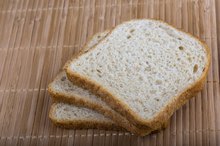Bloating After Eating Carbs
Bloating is caused by many reasons, including your choice of foods. Eating too many carbs or choosing ones that your body can’t properly digest can result in bloating, gas, and other intestinal and stomach discomfort. In most cases, bloating is no reason for concern. If you experience other bothersome symptoms along with bloating, talk to your doctor to find out if there’s an underlying medical problem you need to address.
Water Retention
Carbs retain water, so you might end up bloated if you eat too many of them. This is especially true if you’re dehydrated. When you don’t drink enough water, your body will hold on to every single drop you do drink. Focus on drinking at least eight glasses of water a day, and see if that solves the problem.
- Carbs retain water, so you might end up bloated if you eat too many of them.
Gluten Intolerance or Sensitivity
Does Bread Cause Bloating?
Learn More
Gluten is a protein found in a number of carb products. Wheat is the major culprit, but gluten is also present in barley, oats and rye. According to nutritionist Kate Cook, people who have a sensitivity to gluten will experience bloating, as well as constipation, fatigue and other side effects after consuming it. Gluten intolerance is more serious and can lead to severe allergic reactions, mouth ulcers and bone problems. If you experience bloating along with other symptoms after eating carbs that contain gluten, talk to your doctor to rule out a serious problem.
- Gluten is a protein found in a number of carb products.
- Gluten intolerance is more serious and can lead to severe allergic reactions, mouth ulcers and bone problems.
Ingestion of Non-Absorbable Carbohydrates
Non-absorbable carbs are those that your body cannot digest, such as artificial sugars, including sorbitol and sugar alcohols, which are commonly used in diet foods and drinks, candy and gum. Lactose and fructose are also non-absorbable sugars. Some people have no obvious reaction to consuming these carbs, while others might experience bloating, diarrhea, flatulence and stomach irritation.
High Fiber Content
What Food Groups Are Carbohydrates Found in?
Learn More
Carbs high in fiber can cause bloating, especially if you’re not used to eating them on a regular basis. Ironically, the key to dealing with bloating is to eat more fiber-rich foods, but to do it in small amounts and on a regular basis. This will help your digestive system work more smoothly and will prevent constipation, which also leads to bloating. Bran cereal, vegetables, dried fruits and whole grains are all good sources of fiber.
- Carbs high in fiber can cause bloating, especially if you’re not used to eating them on a regular basis.
- Ironically, the key to dealing with bloating is to eat more fiber-rich foods, but to do it in small amounts and on a regular basis.
Related Articles
References
- Nutrition Coach: Gluten Intolerance and Nutrition
- AskDrSears.com: Fantastic Fiber
- National Institute of Diabetes and Digestive and Kidney Diseases. Symptoms & causes of gas in the digestive tract. Updated July 2016.
- Sullivan SN. Functional abdominal bloating with distention. ISRN Gastroenterol. 2012;2012:721820. doi:10.5402/2012/721820
- American Addiction Centers. Alcoholic gastritis symptoms, causes & treatment. Updated Aug 6, 2020.
- National Institute of Diabetes and Digestive and Kidney Diseases. Eating, Diet, & Nutrition for Gas in the Digestive Tract. Updated July 2016.
- Cleveland Clinic. Gas: Care and treatment. Oct. 25, 2016.
- Harvard Health Publishing. Relief from intestinal gas. September 2013.
- Treatment for Gas in the Digestive Tract. National Institute of Diabetes and Digestive and Kidney Diseases.
- Foley A, Burgell R, Barrett JS, Gibson PR. Management strategies for abdominal bloating and distension. Gastroenterol Hepatol (N Y). 2014;10(9):561–571.
Writer Bio
Tammy Dray has been writing since 1996. She specializes in health, wellness and travel topics and has credits in various publications including Woman's Day, Marie Claire, Adirondack Life and Self. She is also a seasoned independent traveler and a certified personal trainer and nutrition consultant. Dray is pursuing a criminal justice degree at Penn Foster College.









